- Home
- Trevor Hoyle
Blind Needle Page 11
Blind Needle Read online
Page 11
‘The harbour.’
‘I don’t want to see the harbour.’
‘You won’t see it anyway in the dark.’
‘There’s no point then.’
‘Come on, I want to show you something …’
I could feel flecks of rain cold on my face as we turned into the wind. Underfoot the harsh cinders became sludge, sucking at my boots like tiny glutinous mouths. If he was going to kill and rob me there was no better time or place. Dimly I saw the sheer rusted sides of old abandoned ships wedged fast in the mud, their funnels leaning over in weary attitudes. Any minute now, I thought, my shoulders tensing, getting ready for the blow. I was nearly up to my ankles in mud. If I’d tried to run I couldn’t. I said, ‘That’s enough. I’m going back.’
‘Not now,’ he hissed. He was bending, searching for something – probably to hit me with. I wouldn’t see him strike, just a blinding flash of light, and then the pit, the abyss, nothing. I would be at peace at last. It occurred to me that that was what I really wanted.
‘Hold this.’ I felt a ribbed metal casing and a button. ‘Point it down there. Shield the light.’ I held out my overcoat like the flap of a tent and switched on the torchbeam. It illuminated a circle of grey mud with black viscous bubbles rising to the surface. As they exploded like soft farts they released the sweet stench of decay. He was probing deep down with a broken spar, its raw end coated with clinging mud, like a witch stirring a cauldron. He struck something, and heaved. The spar had pierced a sack. As the mud drained away the sack was revealed in the beam as the torso of a man, his back criss-crossed with puffy white lacerations: a bloated meaningless scrawl that might have been an attempt at a design the artist grew tired of and gave up, or the work of a sadist.
The body sank back and gurgled as the bubbling surface closed over it, popping like liquid glugging from a bottle.
The young man threw the spar away. I switched off the torch.
My forehead was cold and wet with the night air and the drizzle and my own sweat. ‘Who is it?’
‘Benson’s partner. Ex-partner. Benson was screwing his wife and he found out about it.’
‘So Benson had him killed – for that?’
‘That amongst other things.’
‘And his body dumped here?’
The young man laughed wheezily. He said, ‘There was a cock-up. He should have ended up in the Irish Sea but the outflow pipe from the baths got fouled up. The tide brought him back.’
In Benson’s business diary there had been several references to ‘baths schedule.’ I’d assumed they had something or other to do with his function on the council sub-committee. Now it appeared that Benson was diving into even murkier depths, which included the murder of troublesome and unnecessary people, and the local swimming baths a convenient disposal point. And it occurred to me, too, that this was how he had driven Susan to the desperate extremity of taking her own life; after his ‘fling’ with her he had taken a fancy to the wife of his partner, moved swiftly on his philandering way, and dumped Susan just as he had dumped this body in the black harbour mud. Now that I had seen him in the mottled, sleekly gross flesh, with his wavy grey hair and diamond ring and overbearing arrogance, it was all too easy to fit the man to his crimes, to understand how he barged through life, as he might shoulder his way to the head of a queue, selecting, consuming, discarding at will, on a whim.
In the darkness the young man’s hoarse voice said, ‘That’s what he does to people who get in his way. So I’d be careful if I were you.’
3
Most people would have instinctively shied away from him. At any moment, you felt, he might slip, slide and plunge into wild desperate mayhem. But he seemed to be the only person who knew certain things about this place and was willing to divulge them, and so I followed as he led the way round the harbour, skirting the basin of mud until we came to a wharf that had come to resemble a graveyard. On one of the jutting stone jetties a solitary lamp illuminated a wasteland of broken ships embedded in the mud at topsy-turvy angles, entire hulls, stripped of their superstructures, littered about like empty rusting coffins.
In answer to my question he told me his name was Trafford. I halted and said, ‘No more bodies. I don’t have the stomach for it,’ and he laughed – or rather made a thin, rasping sound as if emptying his lungs of air.
We traipsed on past hulks and fragments of ships and arrived at the shadowy bulk of something about the size of a trawler with an iron ladder clamped to its side. Trafford climbed up with raincoat flapping and dropped down out of sight. I went after him, swung myself over, and saw him duck through a slanting doorway. Holding onto the walls to stop myself sliding across the deck, I followed him inside.
He had made his home in this tilting world, I saw, as he lit the stub of a candle in a jam-jar.
There were open tins of food with spoons stuck in them, split packets of biscuits, a carton of milk torn to make a pouring funnel, a general litter heaped in a corner of margarine tubs, flattened soft drink cans, plastic bottles, greasy wrappers, decaying fruit cores. In the crevice formed by the steep angle of wall and floor he had wedged blankets and clothing to make a bed. Possibly this had been the crew’s quarters or messroom, though it was hard to be sure because everything not of the iron fabric of the ship had been unscrewed, torn out, scavenged.
From here he must have seen everything that went on in the harbour, which explained how he had known about the body. And a good deal more besides.
Trafford propped himself in the corner, legs drawn up, and munched biscuits from the packet. I then noticed, under the long straggling hair, patches of greyish white; tufts of hair and flakes of skin lay thickly on his collar. There was a raw, dank atmosphere in the cabin, but even so his forehead was streaming with sweat. In the enclosed space I could smell the putrefaction that hovered around him like a deathly cloud.
‘Have you figured it out yet?’
‘What?’
‘You must have done. Isn’t that why you went to the council meeting?’ He broke the biscuits in two and crammed them into his mouth.
‘You tell me,’ I said.
‘They’ve made a deal with the Station – all their hot water for nothing. It’s piped straight in, free of charge. The town’s a dump, haven’t you noticed?’
Brickton was a dump all right, but perhaps that wasn’t what he meant.
‘I know,’ Trafford said, ‘because I used to work there.’ He coughed, spitting out biscuit fragments, and wiped away something bloody on the back of his hand.
‘You worked … where?’
‘At the Station. Structural maintenance, F Section. How do you think I got a dose of 742 millisieverts and a white corpuscle count an HIV Positive wouldn’t swap? Your msv is probably sky-high by now, it’s inevitable. Have you seen the kids round here? Most of them look as if they’ve got a fever, grey shiny skin, hot eyes, losing their hair. It’s something to do with the bone marrow not producing enough white blood cells.’ He crunched some more biscuits and poured milk into his mouth, swallowing the lumpy mess.
‘Why would they deliberately contaminate their own children?’ I crouched down on the sloping floor, though not too near him: he was corroding before my eyes. ‘I can’t believe that. The councillors live here, they can’t possibly know what’s happening. If they knew, they wouldn’t allow it to happen.’
‘They’ll know when they start dying,’ Trafford said.
‘They’ve got families too!’ I protested.
‘Each man kills the thing he loves.’
I had no answer to that.
‘They know all right,’ Trafford went on, ‘only they won’t admit it, even to themselves. People are like that. Listen, I worked at the Station, I knew the risks, I saw the signs, but you close your mind to such things. We all do it. Even now I pretend I’m not dying.’
‘The water in the public baths – it comes directly from the Station?’ I wanted to be sure I understood.
‘Sure! T
hey’ve got a pool brimming with it, hot and rich.’ He laughed weakly. ‘They don’t use it much though, not often, it’s too lethal. Too many warm bodies floating out to sea.’
‘This is mad,’ I said. I didn’t think so, but it seemed the only response that made sense. Better than anyone I knew the monstrous deceptions human beings were capable of; I was the arch practitioner.
‘Yes it is,’ Trafford agreed. ‘Completely, ‘seeming, just for the moment, very calm and rational. ‘Until you look at the balance sheet. Someone’s making a packet out of it – probably your mate Benson. He dumps the sludge into the harbour, so very likely he’s wangled the hot water deal as well.’
‘Just to make money?’
‘What do you mean, “just”? What other reason is there?’
‘Do you know somebody called Russell Rhodes?’
The bloodshot eyes roamed vaguely to and fro, went up to the ceiling, or bulkhead, since this was a boat. I thought he was pondering this, struggling to remember, but then he said flatly, ‘Yes, I know good old Russell. He’s my ex-boss.’
‘What is he?’
‘PL manager at the Station.’
‘What’s that?’
‘Processing Line Manager.’
‘Is he involved?’
He wearily closed his eyes, as if the effort of keeping them open was too much. ‘They’re all involved, the pack of them. Russell, Benson, the council by turning a blind eye, the local press for not asking questions, Benson’s ex-partner’s wife …’
‘The wife of the man who was killed?’
He nodded, still with his eyes shut, and went on listlessly, ‘She’s a grade-A bitch, ribbon and bar. It was her and Benson who got rid of hubby. The deal was too big for him, too scary – or maybe he even had a twinge of conscience about it. The pair of them drove him to a nervous breakdown, poor sod, but it wasn’t enough, so they had him dumped in this dump.’
I felt a sudden shudder, as if someone had walked over my grave. The idea of a wife plotting with another man to murder her husband shot a chill right through me.
‘What about Benson’s wife? She must have been in on all this.’
‘He hasn’t got a wife.’
I was stunned. ‘I thought he was married.’
‘Not any more. She’s been dead five years. Cancer. He’s shacked up with the grade-A bitch of the first water. Has been for over a year. They’re a good match.’
Trafford opened his eyes blearily, slumped in the corner. His energy seemed to come in bursts, and just as quickly to dissipate. I said, ‘Tell me something, this is what I don’t understand: how do they hope to make a profit? The council saves money but no one individual stands to gain. It’s being done for the benefit of the community.’
‘You tell me something. Where does the money go?’ When I looked puzzled he went on, ‘The money they save – where does it go?’
‘It doesn’t go anywhere.’
‘Doesn’t it? It has to be spent.’
‘I suppose so.’
‘On what?’
‘I don’t know.’
‘I do,’ Trafford said. He jabbed his scaly finger at the slanting doorway, as if pointing to a picture in a lopsided frame. I frowned at him, shaking my head. ‘The marina,’ Trafford said, as if to a mental defective. ‘That’s what they’re planning to build out there.’
‘But it’s a radioactive sewer …’
‘Don’t tell the EEC that, they’re forking out twenty-two million quid to help build it. Your mate Benson has his sticky fingers in that too. You’ve seen the sign, haven’t you? “Benson Developments (Holdings) Plc?” You’ve got to admire him. He’s the shining entrepreneurial spirit of the age. The man’s a fucking financial genius. Probably get a knighthood for it. They ought to make him chancellor.’
The Brickton Marina and Yacht Club. Sleek white yachts with cutting prows and three-tier cabin cruisers like hunks of wedding cake bobbing at anchor above a hotbed of radioactive sludge … I could see a floating population of the new leisured overclass – fast-food franchisers, mail-order tycoons, DIY magnates, video distributors, real estate speculators, satellite TV executives, scrap metal merchants and investment analysts – the whole sordid rag-bag – lying at ease on their expensive craft and, like Trafford, decaying from the inside, weeping patches showing through their artificial tans, hanks of hair missing from their coiffures, manicured fingernails flaking like bits of tissue paper from their gold-spangled hands.
Benson’s ‘shining spirit,’ I began to realise, represented the egalitarian ideal: his kind were not in the least class conscious, were prepared to exploit the rich as well as the poor, maintained no loyalties to breeding or tradition, had no misplaced sense of deference to their ‘betters’. They would steal off anyone and everyone without a twinge of conscience, feel not the slightest tug of guilt provided the deal could show a healthy profit margin after tax avoidance.
Trafford was guzzling milk. It occurred to me that he might be increasing his becquerel count even as he did so. But then that applied to us all – even the brown rice and organic vegetable brigade.
‘I don’t know what your grouse is,’ he said, wiping his mouth, ‘but it’s too late to do anything. The bastards have taken over. We’re pissing into the wind.’ He held up his hand, clawlike, the ligatures showing though like the transparent anatomical models medical students use. ‘They’ll kill us all in the end. Consume their own young.’
‘Better let ‘em get on with it,’ I said.
‘That’s the spirit.’
‘But not before I deal with Benson,’ I said.
‘Won’t do any good.’
‘It’ll do me some good.’
‘They’ll still win.’
I shrugged. ‘Is there anything I can do for you?
‘Stay out of that little fat swine’s way – him with the brown grin and the dagger on his arm. They breed very nasty these days. It’s the climate. Don’t end up bare-arsed in the mud with a purple number tattooed on your foreskin. In fact,’ Trafford said, ‘if you get half a chance, finish the bugger off before he does for you.’
‘He won’t kill me,’ I said uncertainly. I went on, making my voice confident, ‘I’ve got something his boss needs. It could land them all in – hot water.’
Trafford laughed his empty, gasping laugh. He farted softly at the same time, an equal and opposite reaction. ‘I had a beautiful idea,’ he said, ‘but it didn’t come off. I was going to do a Chernobyl on them, make a volcano and boil the sea. That would have upset their plans for half-a-million years. Underwrite my own what you might call long-term investment in the future. I started tampering with the fuel rods and gave myself, stupid bugger, a dose instead. They drummed me out. That’s when I went to the council meeting. I knew it wouldn’t do any good, and it didn’t. That’s the trouble with the layman: he’s taken in by a man with a moustache and pipe and smart suit sitting behind a clean desk with two telephones. Clever bastards, you know. Squeaky-clean PR. They could prove you’re a single-parent Mongolian lesbian and you’d believe them.’ He scraped some white mucus from the corner of his mouth and said without rancour:
‘They always win, it’s written in the rules, because if nothing goes wrong they’re proved right, and if something does go wrong there’ll be nobody around to point the finger, just a glowing core and a blank space on the map.’
I said, ‘Perhaps that’s the best thing’ – smiling at him – ‘that could happen to Brickton.’
‘My sentiments entirely,’ said Trafford, coughing blood.
Chapter Seven
1
My life was lived half in a dream anyway, and so I might well have dreamt the events of the previous night except for the fact that my boots were mired with dried black mud. I sat on the edge of the bed staring at them for several minutes. I could see the young man’s face in the light of the candle, creased and ravaged, the flashing gleam of his eyes. And the pale sack of lacerated flesh oozing down beneath the bubb
ling surface. All this might have been the product of my imagination, but the mud on my boots was real and refused to disappear, even though I stared and stared.
Benson a murderer. The fact of it hadn’t sunk in.
I went to the tap along the passage for some water and glanced up at the ceiling, thinking of the attaché case in the attic above. I could blackmail Benson – except of course I didn’t want his money. But I could destroy his rich, comfortable, well-rounded life. His pretty dark-eyed daughter, his large house, his business: all were legitimate targets. Leave Benson till last and then destroy him …
The cold water washed the sleep from my eyes. I dressed quickly, thinking as I did so that I ought to eat something. It was a mechanical decision: hunger seemed to have left me. But if I didn’t eat I wouldn’t be able to think straight, and it was important now not to act stupidly.
At the top of the stairs I paused, buttoning up my overcoat, hearing voices in the shop. Mr Patundi was being shouted at, but not, this time, by his wife. There was a scuffling of feet, angry words were exchanged. I retreated quickly along the landing as footsteps approached the bottom of the stairs and kept moving backwards until I reached the narrow door leading to the attic. As the footsteps came up I nipped inside and pressed my ear to the door.
Somebody went directly into my room, as if they knew what they were looking for, and walked about. A voice said something I couldn’t make out and Mr Patundi, who must have been standing in the doorway, stammered, ‘He tells me his name is Holford. This is true, I swear—’
The footsteps came out and the voice, which I now recognised, said with incredulity, ‘Holford? You lying wog. Come on, sambo, out with it, where is he? He hasn’t gone out, has he, or you’d have seen him, wun’t yer? Going through the shop?’
‘He might go when I was not there,’ Mr Patundi said. ‘Or the back door.’ I could almost see his shrug and the roll of his yellow eyes. ‘He goes, he comes, I don’t know always.’

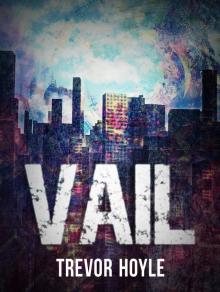 Vail
Vail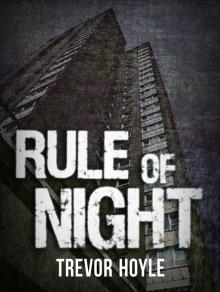 Rule of Night
Rule of Night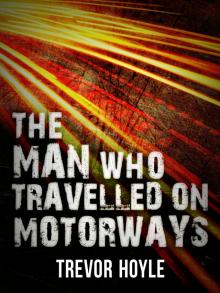 The Man Who Travelled on Motorways
The Man Who Travelled on Motorways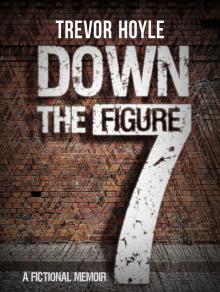 Down the Figure 7
Down the Figure 7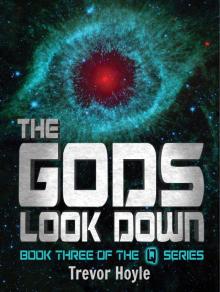 The Gods Look Down
The Gods Look Down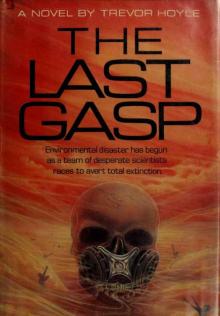 Last Gasp
Last Gasp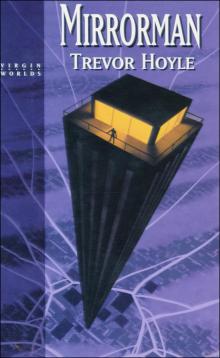 Mirrorman
Mirrorman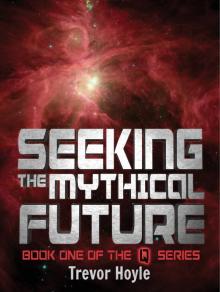 Seeking the Mythical Future
Seeking the Mythical Future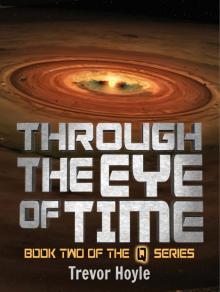 Through the Eye of Time
Through the Eye of Time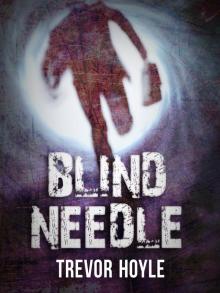 Blind Needle
Blind Needle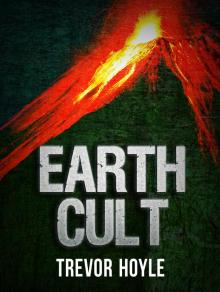 Earth Cult
Earth Cult